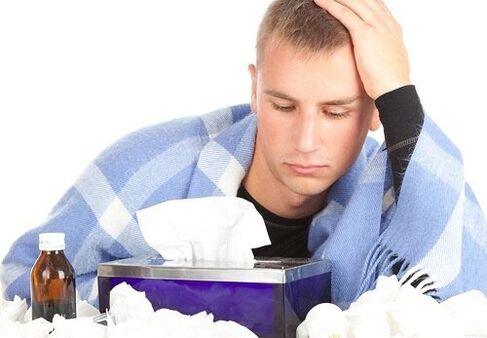In men, the treatment of prostatitis involves the use of both medications and physiotherapy. Phytotherapy, glandular massage, acupuncture can be prescribed as additional methods for patients. It is an integrated approach that allows not only to prevent the disease from getting worse, but also to get rid of it completely. Medication for prostatitis is always done in courses and is prescribed only after a complete examination of the prostate gland.

Medicines to treat prostatitis will only be effective if they are prescribed correctly by your doctor.
fixed assets
Usually, urologists prescribe several medications to patients with inflammatory prostate disease. This will allow you to treat your abnormalities much faster. Antibacterial and immunostimulatory drugs, muscle relaxants, hormonal agents and alpha-blockers are used to improve its condition.
After careful analysis of the analyzes and ultrasound results, the treating physician will prescribe an individual treatment regimen for each patient.

It is impossible to choose medications for prostatitis on their own, as this can lead to a deterioration not only in the condition of the prostate but also in general well-being.
Medication for chronic prostatitis with antibiotics is not always warranted. If the patient has no symptoms of the disease and at the same time feels normal, this group of drugs is not prescribed. In this case, chronic prostatitis can be treated with herbal medicines and alpha-blockers.
Antibacterial drugs
When detecting chlamydia and other infections, fluoroquinolones can be used, which have a high bioavailability and penetrate the prostate mucosa as soon as possible.
Upon detection of prostatitis, the patient is prescribed medication, including an antibiotic. The treatment regimen is selected by the physician depending on the patient's condition.
If the use of fluoroquinolones does not achieve the desired effect, your doctor may prescribe treatment with other medicines. If laboratory tests have shown the presence of chlamydia, tetracycline is recommended. Their effectiveness is linked to the rapid penetration of the active components of the drug into the prostate gland and the ability of the drug to kill pathological microorganisms as quickly as possible.
Before re-treating men with recurrent prostatitis, the doctor will develop a new dosing regimen for the antibacterial drug, most often with lower doses. If the medications you selected were ineffective, it could mean that they were not appropriate for the patient or that they were prescribed incorrectly.
Antibacterial preparations are recommended only if pathogenic microorganisms have become the cause of prostatitis.
It should be recalled that bacteria are almost always present in one way or another in the human body. They are inactive during the normal functioning of the immune system and do not pose a particular health risk. Weakening of the immune system due to other provocative factors results in the activation of the pathogenic microflora, which penetrates the prostate tissue and leads to acute disease.

The acute phase of bacterial prostatitis requires the use of antibacterial agents. If such treatment is not performed, inflammatory processes may occur in the bladder, urethra and kidneys. There is evidence for an association between bacterial prostatitis and urolithiasis. The lack of antibiotic therapy leads to a chronic form of the disease that is much more difficult and prolonged to treat.
Principles of appointment
In the case of acute prostatitis, the medication is prescribed immediately after the general examination and interrogation of the patient. Generally, the urologist will not wait for the results of the tests and will prescribe the intake of macrolides, fluoroquinolones, and aminoglycosides in the first few days. Patients are less likely to be prescribed erythromycin antibiotics, as such agents should not lead to the mass destruction of bacterial microorganisms.
Once the urologist has received the test results, your doctor may change your treatment regimen or include other medications. Only one drug is indicated for mild prostatitis. The age of the man and the presence of other diseases should be taken into account when selecting medicines. If the patient has liver or kidney disease, the dose may be adjusted according to the degree of organ dysfunction.
The patient should tell the urologist about any medications he or she is taking or has recently taken.
If, for any reason, a man has been taking antibiotics, the doctor should take this fact into account as such medications may be ineffective.

If the universal regimen assigned to the patient does not achieve the desired effect, another more potent regimen may be used. To increase the effect, antibiotics are prescribed as an injection so that a patient with acute inflammation of the prostate can be hospitalized. Treatment of prostatitis at home is done with antibacterial drugs in the form of capsules. In this case, it is extremely important to follow all the rules for receiving such funds. If different from the regimen, therapy may be ineffective. Cancellation or extension of the course can only be done by a doctor.
In general, properly selected antibacterial drugs will have a positive effect on the third day after starting administration. If symptoms persist, a urologist should be consulted to review the treatment regimen.

Hormonal preparations and suppositories
Properly prescribed medication will help reduce the symptoms of inflammatory disease of the prostate. First, the discomfort associated with prostatitis disappears during urination. Pain, bladder problems, and erectile dysfunction may persist with the use of inappropriate medications. Some men tend to have a gradual worsening of potency. Very often, in the absence of immunomodulatory agents, the disease may return in the treatment regimen.
In the absence of positive results, the patient prescribes hormonal agents for the treatment of chronic prostatitis. They help relieve inflammation, restore erections.
Such medications, although effective, can have a number of side effects and should be used with caution and at the exact dosage recommended by your doctor.
In case of inflammation of the gland, rectal suppositories can also be used as excipients. Such suppositories are generally well tolerated by patients because they contain natural ingredients. Complexes containing extracts of honey, propolis, anti-inflammatory and disinfectant herbs have a good effect.
Rectal suppositories help relieve swelling of the gland, reduce pain, and normalize blood microcirculation.
Suppositories or tablet formulations based on sublimated bovine prostate can be purchased at pharmacies today. They improve the structure of prostate tissues, relieve inflammation and help speed up regeneration processes.
The use of complexes containing vitamins and trace elements is seen to restore the body and strengthen the immune system, which is often weakened after inflammatory disease of the prostate. Patients may also be prescribed antioxidant medications to help prevent the development of prostate hyperplasia and malignancies.



























